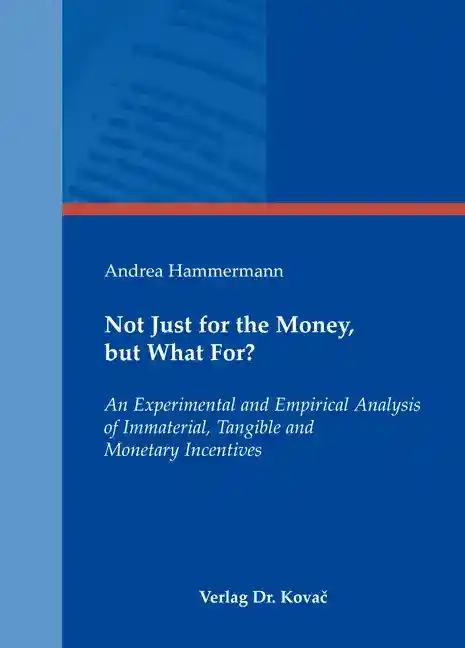Andrea HammermannNot Just for the Money,
but What For?
An Experimental and Empirical Analysis of Immaterial, Tangible and Monetary Incentives
Personalwirtschaft, Band 41
Hamburg 2013, 162 Seiten
ISBN 978-3-8300-6881-5 (Print)
ISBN 978-3-339-06881-1 (eBook)
Zum Inhalt
One of the great challenges in personnel economics is how to align employee’s best interest to that of the employer. The literature on incentive theory has up to now focused mostly on monetary incentives. Indeed, many facts speak in their favor. Money is storable, fungible, easily tradable, and mainly independent of the recipient’s preference because of its option value. But recent empirical findings suggest that monetary incentives, like piece rates, can backfire. The belief that everything has its price is definitely not true for areas in which prices are not accepted. If people’s relationship and the significance of underlying intentions is taken into account immaterial incentives, like attention and respect, as well as tangible incentives can be better choices.
This book addresses effectiveness of nonmonetary incentives. It consists of four empirical studies providing insights into “why? and “how? nonmonetary incentives affect human behavior and on potentially divergent effects of nonmonetary and monetary incentives. To this end, we adduce psychological approaches about work motivation as a background to explain the differences in work performances. Specifically, we pay attention to the question if a purely symbolic reward can enhance work performance due to employees’ competitive preferences and by disclosed statuses appealing to their feelings of pride and shame. Additionally, the impact of group affiliation on team mate choices, including the sources as well as consequences of in-group favoritism, on work output are investigated in more detail. Finally, we concentrate on the question why tangible incentives are used in addition to money and whether these cause different reactions and feelings on the part of the recipient. The evidences gained by experimental and empirical methodology highlight the important and unique role of nonmonetary incentives.
